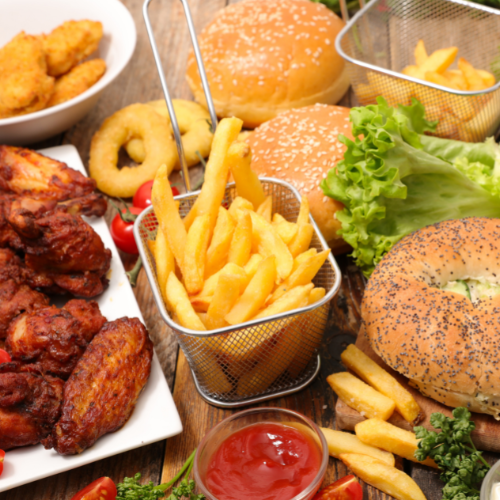It’s 5pm, you’ve just gotten off work and haven’t even thought about what you’re having for dinner. That drive thru is calling your name. Did you know that a little over one-third or about 37% of Americans eat fast food on any given day?
Many fast food restaurants are focused more on producing a product quickly and less on producing a product with healthy quality ingredients. Fast food tends to be quick and easy on your pockets when you’re in a bind making it pretty convenient, right? For time purposes sure, but too much fast food can negatively affect your body making it very inconvenient for your health in the short term and long term.
While the occasional trip to the golden arches to get your cheeseburger and french fry fix isn’t going to significantly affect your health, daily intakes of unhealthy fast food can affect your body negatively in many different ways.
Short Term Effects
Rise in blood pressure
Fast food is infamous for being packed with crazy amounts of sodium. While sodium can make your food taste delicious, too much sodium can increase your blood pressure and put stress on your cardiovascular system.
The American Heart Association recommends you keep your sodium intake under 2,300 mgs a day. On average, a burger and fries meal can have anywhere from 1,200-2,000 mgs of sodium. That's almost your daily amount right there in one meal.
Drains your energy
Fast food is also filled with empty carbohydrates and sugar which can cause a spike in your blood sugar levels. When your blood sugars quickly spike this causes your body to hurry and produce insulin in order to bring it back down. This sudden spike then crash can cause fatigue and irritability.
Bloating
When you eat too much sodium your body begins to retain water and cause bloating and puffiness. The high fat content and refined carbs, such as buns or breading, can also contribute to bloat and leave your stomach feeling uncomfortably tight and full.
Long Term Effects
Digestion
Because fast food often lacks quality ingredients, this means it lacks important nutrients that your body needs, such as fiber. Eating an adequate amount of fiber daily helps to keep things moving through your digestive system.
While that blueberry scone may give you a good amount of your daily carbohydrates, it probably only offers 1 or 2 grams of fiber at most. It is recommended that you get 21-25 grams of fiber per day to keep a healthy digestive system. Lack of fiber can eventually lead to constipation and other digestive issues.
Cardiovascular system
As we discussed above, high amounts of sodium can raise your blood pressure. A constant raise in blood pressure is a condition known as hypertension, or high blood pressure. When you have high blood pressure your heart has to work much harder to pump blood throughout your body. This puts a tremendous amount of stress on your heart which can lead to heart attack, stroke, and heart failure.
Weight Gain
Most fast food places and restaurants in general will give you double or maybe even triple the serving size you need for a meal. Regularly eating too many calories or portions that are too large will eventually lead to weight gain.
High Cholesterol
A Lot of your fast food favs such as french fries are fried in oils that are high in fat, including saturated fats. If not eaten in moderation, saturated fats can raise your LDL or “bad” cholesterol. High cholesterol puts you at risk for heart attack, stroke and other health issues.
Tips to ditch fast food
Know your calorie needs
The number of calories a person needs varies depending on multiple factors, including your age, gender, height, weight, and level of physical activity. Other factors that contribute to your recommended calorie intake also depend on your desire to lose, maintain, or gain weight.
Knowing your calorie needs can help you avoid fast food restaurants and the overeating that comes along with them. Use our Calorie Calculator here.
Meal prep
Most people can agree that lack of time is one of the top reasons why they opt for fast food over cooking. When you have limited time you’re more likely to grab something that is fast. Having your meals prepped ahead of time ensures that you always have something available to eat and will save you time and money in the long run.
Meal prepping for the week can take several hours if you do it yourself. If you can’t make the extra time for this, consider buying your meals already prepared. Meals and snacks are fully cooked, balanced, and easy to grab and go, great for when you’re short on time. For extra help planning your meals for the week, download our Winning Week Meal Planning Worksheet.
Eat quality ingredients
Quality ingredients are real and minimally processed ingredients that your body knows how to digest and use as fuel. They’re usually slow digesting, nutrient dense, and leaves you feeling full and energized.
Unlike processed ingredients that are commonly found in fast food meals, Quality ingredients don’t contain, or are very limited in: preservatives, artificial flavors and colors, refined sugars, hormones, and antibiotics.
Eating quality ingredients is also a sure way to get your body the daily nutrients it needs to stay healthy.
Allow a cheat meal
Gradually making changes instead of going cold turkey has shown to have a positive impact on your goals. If your goal is to cut down on fast food, slowly make this change and allow yourself to still have it every once in a while. Having a cheat meal or “treat meal,” can satisfy your cravings while still staying on track with your healthy diet.
Bottom Line
While fast food is super convenient when you’re short on time and need something quick, it can be an inconvenience to your health in the short and long term.






